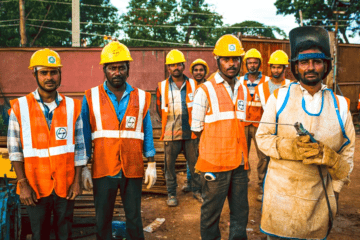
This article is written by Nehal Sharma of 2nd Year of MIT World Peace University, an intern under Legal Vidhiya.
Abstract:
This comprehensive article delves into the historical evolution, impact, and challenges of trade unionism in India. The article begins by tracing the early beginnings of trade unionism during the colonial era, highlighting the formation of the first recognized trade union, the “Bombay Mill Hands Association,” in 1890. The role of Mahatma Gandhi in integrating the labor movement into India’s struggle for independence is also explored. Post-independence, the Indian government adopted a pro-labor approach, enacting crucial labor laws like the Industrial Disputes Act of 1947 and the Trade Unions Act of 1926 to regulate industrial relations and promote trade unionism. The impact of trade unionism on workers is examined in detail. Trade unions have played a pivotal role as a collective voice for workers, advocating for better wages, improved working conditions, and social security benefits. Their efforts have established minimum wage laws, working hour regulations, and safety standards, contributing to social and economic equality by fighting against discriminatory practices.
Despite their positive contributions, trade unions face several challenges. Fragmentation along political lines and excessive politicization have led to competing interests and reduced effectiveness. Organizing workers in the informal sector and unorganized labor remains challenging due to the need for formal organization and legal recognition. The effects of globalization and economic reforms on trade unionism are discussed, including job insecurity and the rise of contract labor. Anti-union practices by some employers and delays in resolving labor disputes present further obstacles. To strengthen trade unionism in India, the article suggests adopting a non-politicized and unified approach, extending outreach to workers in the informal sector, and adapting to changing economic realities. Strategies for strengthening trade unionism include investing in capacity building and skill development, collaborating with international labor movements, and advocating for enhanced legal protections.
The article concludes by emphasizing the importance of trade unions in safeguarding workers’ rights and social justice while highlighting their potential to shape a more equitable society for all. It stresses the need for a united and inclusive trade union movement to address the challenges and continue contributing significantly to the welfare of the Indian workforce.
Keywords:
Trade Unionism, India, Evolution, Impact, Challenges, Workers
Introduction:
Trade unionism in India has a long and rich history that dates back to the colonial era. The struggle for workers’ rights, better working conditions, and social justice has played a crucial role in shaping the labor movement in the country. Over the years, trade unions have evolved and grown, representing the interests of millions of workers across various sectors. This article explores the historical development of trade unionism in India, its impact on the labor force, the challenges faced, and the way forward.
1. Historical Evolution of Trade Unionism in India
1.1 Early Beginnings
The roots of trade unionism in India can be traced back to the early 20th century when the working class started organizing themselves to protest against unfair labor practices under British colonial rule. The first recognized trade union was the “Bombay Mill Hands Association,” formed in 1890 by N.M. Lokhande primarily focused on demanding better wages and working hours for textile workers in Mumbai.
1.2 The Role of Mahatma Gandhi
During India’s struggle for independence, Mahatma Gandhi brought the labor movement into the freedom struggle. He advocated for workers’ rights and encouraged nonviolent methods of protest to address their grievances. The All-India Trade Union Congress (AITUC) was founded in 1920, becoming the first national-level trade union body, and it played a significant role in mobilizing workers for the independence movement.
1.3 Post-Independence Era
After India gained independence in 1947, the government adopted a pro-labor approach, recognizing the importance of protecting workers’ rights. The Industrial Disputes Act of 1947 and the Trade Unions Act of 1926 were passed to regulate industrial relations and promote trade unionism in the country. Trade unions flourished, and workers’ participation in industrial decision-making processes increased.
2. Impact of Trade Unionism on Workers
2.1 Collective Bargaining Power
One of the primary benefits of trade unionism is its ability to negotiate with employers on behalf of workers. Trade unions act as a collective voice for workers, enabling them to demand better wages, improved working conditions, and social security benefits. Through collective bargaining, workers can exert more influence and achieve concessions that would be difficult to attain individually.
2.2 Workers’ Rights and Welfare
Trade unions have been instrumental in securing workers’ various labor rights and welfare measures. They have played a crucial role in establishing minimum wage laws, working hour regulations, and workplace safety standards. Additionally, trade unions have advocated for providing social security benefits, such as provident funds, medical insurance, and pension schemes, to ensure workers’ economic well-being.
2.3 Social and Economic Equality
Trade unionism has significantly promoted social and economic equality in the Indian workforce. By fighting against discriminatory practices and ensuring fair treatment for all workers, irrespective of gender, caste, or religion, trade unions have played a role in reducing inequality in the labor market.
3. Challenges Faced by Trade Unionism in India
3.1 Fragmentation and Politicization
One of the significant challenges faced by trade unionism in India is the fragmentation of unions along political lines. Several trade unions are affiliated with political parties, leading to competing interests and a need for unified action. This political influence often hampers the effectiveness of trade unions in representing workers’ genuine concerns.
3.2 Informal Sector and Unorganized Labor
The informal sector and unorganized labor form a significant portion of the Indian workforce. Unfortunately, trade unionism has struggled to penetrate these sectors effectively. Due to the lack of formal organization and legal recognition, informal sector workers need help organizing and collectively voicing their demands.
3.3 Globalization and Economic Reforms
The liberalization and globalization of the Indian economy since the 1990s have led to a shift in the dynamics of trade unionism. Economic reforms and privatization have resulted in job insecurity, contract labor, and reduced unionization rates. The increased mobility of capital and the threat of businesses relocating to more favorable locations have made it challenging for trade unions to negotiate effectively.
3.4 Legal Framework and Anti-Union Practices
Despite labor laws and regulations, some employers use anti-union practices to discourage unionization efforts. Workers attempting to organize or participate in strikes may face harassment, threats, or dismissal. The lack of effective enforcement mechanisms and delays in resolving labor disputes further challenge trade unionism.
4. The Way Forward: Strengthening Trade Unionism in India
4.1 Unity and Non-Politicization
To address the challenge of fragmentation, trade unions must focus on unity and solidarity among their ranks. Keeping political affiliations separate from the core objectives of representing workers’ interests is essential. Non-politicization of trade unions will enhance their credibility and effectiveness in advocating for labor rights.
4.2 Inclusivity and Informal Sector Outreach
Trade unions must make conscious efforts to include workers from the informal sector and unorganized labor in their folds. Special provisions and innovative approaches should accommodate these workers’ unique needs and challenges. Awareness campaigns and capacity-building programs can enhance their participation in trade union activities.
4.3 Adapting to Changing Economic Realities
Trade unions must adapt to the changing economic landscape of globalization and technological advancements. They should adopt modern communication methods and utilize social media to connect with a broader base of workers. Additionally, unions need to be proactive in understanding and addressing the concerns of workers in the gig economy and emerging sectors.
4.4 Strengthening Legal Protections
Efforts should be made to strengthen the legal framework for protecting workers’ rights and ensuring effective enforcement of labor laws. Stringent measures against anti-union practices and timely resolution of industrial disputes are crucial for fostering a conducive environment for trade unionism.
5. Role of Trade Unions in Social Movements
5.1. The Struggle for Social Justice
Trade unions in India have focused on workplace issues and actively participated in broader social movements. They have aligned themselves with various causes, such as environmental protection, gender equality, and human rights. By joining hands with civil society organizations and advocacy groups, trade unions have contributed to shaping public policy and societal change.
5.2. Advocacy for Policy Reforms
Trade unions have been influential in advocating for labor-friendly policy reforms. Their engagement with policymakers and participation in tripartite discussions have formulated progressive labor laws and social welfare schemes. Issues like the right to work, social security, and social protection have gained prominence due to the efforts of trade unions.
6. Challenges Faced by Trade Unionism in India
6.1. Fragmentation and Politicization
One of the significant challenges faced by trade unionism in India is the fragmentation of unions along political lines. Several trade unions are affiliated with different political parties, leading to competing interests and a need for unified action. This political influence often hampers the effectiveness of trade unions in representing workers’ genuine concerns.
6.2. Informal Sector and Unorganized Labor
The informal sector and unorganized labor form a significant portion of the Indian workforce. Unfortunately, trade unionism has struggled to penetrate these sectors effectively. Due to the lack of formal organization and legal recognition, informal sector workers need help organizing and collectively voicing their demands.
6.3. Globalization and Economic Reforms
The liberalization and globalization of the Indian economy since the 1990s have led to a shift in the dynamics of trade unionism. Economic reforms and privatization have resulted in job insecurity, contract labor, and reduced unionization rates. The increased mobility of capital and the threat of businesses relocating to more favorable locations have made it challenging for trade unions to negotiate effectively.
6.4. Legal Framework and Anti-Union Practices
Despite labor laws and regulations, some employers use anti-union practices to discourage unionization efforts. Workers attempting to organize or participate in strikes may face harassment, threats, or dismissal. The lack of effective enforcement mechanisms and delays in resolving labor disputes further challenge trade unionism.
6.5. Technological Advancements
Advancements in technology and automation have changed the nature of work in several sectors. The rise of the gig economy and the increasing use of contract labor have made traditional unionization models less effective. Trade unions need to adapt their strategies to cater to the needs and concerns of workers in this new economic landscape.
7. The Way Forward: Strengthening Trade Unionism in India
7.1. Unity and Non-Politicization
To address the challenge of fragmentation, trade unions must focus on unity and solidarity among their ranks. Keeping political affiliations separate from the core objectives of representing workers’ interests is essential. Non-politicization of trade unions will enhance their credibility and effectiveness in advocating for labor rights.
7.2. Inclusivity and Informal Sector Outreach
Trade unions must make conscious efforts to include workers from the informal sector and unorganized labor in their folds. Special provisions and innovative approaches should accommodate these workers’ unique needs and challenges. Awareness campaigns and capacity-building programs can enhance their participation in trade union activities.
7.3. Adapting to Changing Economic Realities
Trade unions must adapt to the changing economic landscape of globalization and technological advancements. They should adopt modern communication methods and utilize social media to connect with a broader base of workers. Additionally, unions need to be proactive in understanding and addressing the concerns of workers in the gig economy and emerging sectors.
7.4. Strengthening Legal Protections
Efforts should be made to strengthen the legal framework for protecting workers’ rights and ensuring effective enforcement of labor laws. Stringent measures against anti-union practices and timely resolution of industrial disputes are crucial for fostering a conducive environment for trade unionism.
7.5. Capacity Building and Skill Development
Trade unions should invest in their members’ capacity building and skill development to equip them with the knowledge and tools required to address the challenges of the modern workforce. Training programs on negotiation, conflict resolution, and communication can empower union leaders to advocate for workers’ rights more effectively.
7.6. International Cooperation
Trade unions can also benefit from international cooperation and collaboration with labor movements in other countries. Sharing best practices, learning from successful models, and building global alliances can strengthen the trade union movement in India.
In conclusion, trade unionism in India has come a long way, and its contributions to workers’ rights and social justice must be supported. However, significant challenges must be addressed to ensure its continued relevance and effectiveness in the evolving economic landscape. By fostering unity, inclusivity, and adapting to changing realities, trade unions can continue to play a crucial role in safeguarding the interests of the Indian workforce and promoting a more equitable society. Trade unions must adapt to the changing economic and technological landscape while staying true to their core mission of advocating for workers’ rights and social justice. A united and inclusive trade union movement, free from excessive politicization, will be better equipped to tackle the challenges ahead and contribute to a more equitable and prosperous India for all its citizens.
REFERENCES
- https://blog.ipleaders.in/explained-evolution-of-trade-unionism-in-india/
- https://timesofindia.indiatimes.com/readersblog/lawpedia/trade-unionism-in-india-46867/
- https://vvgnli.gov.in/sites/default/files/Evolution%20of%20Trade%20Unions%20in%20India.pdf
- https://www.huobi.com/en-us/?utm_source=UT&utm_medium=prodnews&inviter_id=11350560




0 Comments